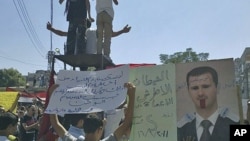Russia and China vetoed a European-drafted U.N. Security Council resolution late Tuesday condemning a government crackdown in Syria and calling for the immediate end to the violence. The resolution had nine votes in favor, but four countries abstained - India, Brazil, South Africa and Lebanon.
The 15-member council has been deadlocked over the possibility of sanctioning the Assad regime for months over its response to demonstrations.
The four European sponsors of the resolution said they watered down their text as much as they possibly could to win consensus, in the end only vaguely hinting at the prospect of future sanctions if Syria did not comply. British Ambassador Mark Lyall Grant said they tried to meet the concerns of other council members.
“We removed the sanctions; still it was unacceptable to the minority," he said. "We called on all sides to reject violence and extremism; still it was unacceptable. We removed any sense that sanctions would automatically follow in 30 days if the regime failed to comply; and still it was unacceptable. By including reference to Article 41 of the U.N. Charter we made it clear that any further steps would be non-military in nature; still it was unacceptable.”
He said the text voted on contained nothing any member should have felt the need to oppose.
U.S. Ambassador Susan Rice said the vote showed the people of Syria who on the Security Council supports their yearning for liberty and human rights and who does not.
“And during this season of change, the people of the Middle East can now see clearly which nations have chosen to ignore their calls for democracy and instead prop up desperate, cruel dictators," she said. "Those who oppose this resolution and give cover to a brutal regime will have to answer to the Syrian people and, indeed, to people across the region who are pursuing the same universal aspirations.”
Russian Ambassador Vitaly Churkin told reporters after the vote that accusations by other council members that Moscow is an advocate of Bashar al-Assad’s regime because it blocked the resolution are false.
“We are not advocates of the Bashar al-Assad regime at all," he said. "We are talking to the government in Damascus in a very demanding tone of voice, telling them what needs to be done in order to get out of this crisis. It is our firm conviction that we are not siding with anybody in Damascus. We are siding with the Syrian people, because we think that in the Syrian people and we know that, there are not just the people who are trying to topple the government, but there are those, and the jury still out about who is in majority, who want to see peaceful change.”
He also reiterated his concern the European resolution, if adopted, could have opened the door to intervention similar to that in Libya, where the council authorized targeted airstrikes aimed at Moammar Gadhafis’ military forces and installations.
Ambassador Rice dismissed that as a “cheap ruse by those who would rather sell arms to the Syrian regime than stand with the Syrian people.”
Ambassador Churkin, whose government has had a close relationship with Damascus stretching back decades to its Soviet era, said the American ambassador’s accusation was not true and Russia has suffered economic losses before in the enforcement of arms embargoes and other sanctions.
The Chinese veto was likely one of solidarity with Russia, as the two countries tend to support each other in the council. The last time they jointly used their veto was in July 2008 to defeat sanctions aimed at the regime of Zimbabwe’s Robert Mugabe.
Syria’s Ambassador Bashar Ja’afari spoke following the vote, accusing Western countries of targeting his government because it has political positions different from the West.
The United Nations says about 2,700 Syrians have been killed in nearly seven months of anti-government protests.
Russia, China Veto UN Resolution on Syria

